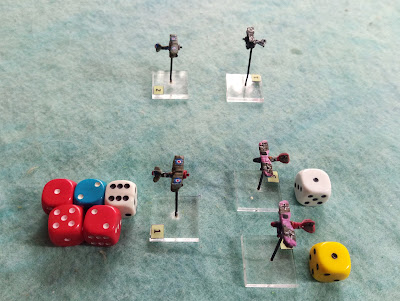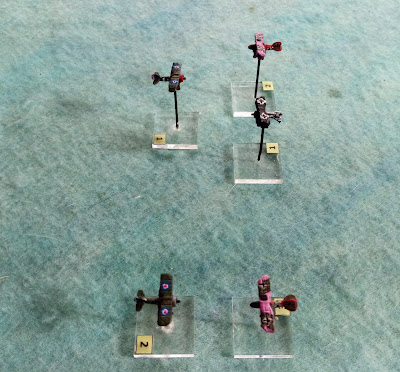After an email exchange with Victor about another Two Hour Wargames (THW) game, I ended up buying a copy of their WW1 air-combat game, 'Aces Up'. At first read-through I wasn't that impressed. The game only has stats for six aircraft types (Fokker Dr1 and DVII, Albatros DIII, Spad VII, Sopwith Camel and SE5a) and is, as you can see, focused entirely on scouts. In addition it follows the general THW route of being a dice-fest with virtually no decisions to be made by the player.
However in an idle moment today I thought that, having paid money for it, I'd give it a try. I ran a couple of test situations to get the mechanisms clear, then set up a game. I decided not to use the random events at this stage, or the Star rules, which allow the player's 'personal' pilot a much higher chance of success and survival.
However in an idle moment today I thought that, having paid money for it, I'd give it a try. I ran a couple of test situations to get the mechanisms clear, then set up a game. I decided not to use the random events at this stage, or the Star rules, which allow the player's 'personal' pilot a much higher chance of success and survival.
I ran two Sopwith Camels against two DIIIs and a Fokker Dr1. All pilots were Rep 3 except the lead Camel (with the red cowling) who was Rep 4. Rep is used for pretty much everything in this game, and is the number you must roll equal to or less than to succeed. It runs from 3-5, unless affected by hits.
If you're familiar with THW games you'll know that they involve moving from one table to another, taking tests against Rep and seeing either how many successes you get or how many more than an opponent you score. The results will generally take you to one or another different tables. The biggest decision you will make is when and where to spend the bonus dice you start the game with.
Anyway, in Aces Up the first thing you do is line up the opposing aircraft against each other, and roll to see how they match up. You roll a D6 for each plane, and the two highest on each side match up, then the next two and so on. Any left-over planes choose (if controlled by a player) or randomly determine, their target.
I controlled the Rep 4 Camel, and found myself facing two DIIs, whilst the NPC Camel was up against the Dr1.
The next stage is the Dogfight table, where the planes roll to see if they can get an advantage over the plane or planes they are matched up with. With two opponents I threw in a few bonus dice for my roll, needing scores of 4 or less. I got three successes, but both of my opponents only got one success each.
My wingman scored one success, but so did the triplane. This means that they go back to the dogfight table and test again, although, of course, any bonus dice spent are now lost.
This is really the only stage where the capability of the plames is used. Aircraft have a Contact and Manuever rating; the first is used when testing on the Dogfight table for the first time, and the Manuever rating is used thereafter. It simply equates to an extra die being rolled if your rating is better than that of your opponent. This is not a game for people into the detailed nuances of aircraft performance and, to be fair, the game makes that very plain from the start.
After a second roll on the Dogfight table the other Camel came out on top.
Winning the dogfight stage is shown by positioning the winning aircraft on the tail of the other. If you beat more than one opposing plane, you choose which one you will go up against. The other(s) take no further part in the round. I went after DIII #2, as it had expended more bonus dice than the other DIII.
Next you test to Take Control and see if you can convert your advantage into a potential shot. My wingman and the Dr1 rolled the same number of successes, which meant that the Dr1 evaded the Camel, and the planes dropped out of this round. I scored one more success than my opponent, which meant I could try a shot.
The next table checks whether you get a full, long-burst, a short burst or simply don't get a decent shot. I failed my roll, and couldn't line up a decent shot, so we went back to the Dogfight table (see what I mean about the tables?)
Again I got the advantage - by this stage though we'd both used up all of our bonus dice. However Bonus dice are replenished at the start of each new round.
This time though I couldn't take control. With no planes in a dogfight situation, the round ended.
Again I checked for matchups, and found myself facing the same DIII, accompanied by the Dr1, whilst the other Camel faced a DIII.
Both Camels won the dogfight phase. My DIII was out of the round as I went after the Dr1.
But neither Camel could convert their advantage to an attack, and the round ended.
The third round saw me take on a DIII, and gain the advantage. Meanwhile the other Camel ended up with an advantage over the Dr1, but was bested by the other DIII. In this case the Camel will roll to line up a shot on its target, but the pursuing plane will get to test for a shot as well.
In fact the Dr1 evaded the Camel, and the Camel managed to lose the DIII, so once again nothing happened. I got a shot at my DIII, though, and inflicted two hits.
If a plane takes damage then it tests to stay in the fight. The DIII broke off and ran for home. But having done so it must test to see if it makes it. It didn't; the German aircraft went down in sight of the action, counting as a confirmed kill for my pilot.
If a friendly plane runs for home, or is destroyed, all other aircraft on that side must test. Both German planes stayed in the fight. But, once again, they found themselves on the losing side in the dogfight.
And I score two hits on the Dr1.
The Dr1 ran for it, and actually made it home safely.
The surviving DIII tested, and decided that discretion was the better part of valour. The inexperienced pilot fluffed his landing, but fortunately he survived and didn't seriously damage the aircraft.
So the Camels drove off two German planes and shot down a third without taking any damage in return.
Did I enjoy it? In a way I guess I did. It is utterly random, but creates an interesting narrative of sorts. But I think it's a game I'd need to tinker with a little to give it more chrome and character. For instance I can see how to include two-seaters and their defensive gunnery, with a small adjustment to the Control table. And the rules could be a lot clearer in places.
Anyway, this Sunday afternoon diversion is another game to add to this year's total.





















Hello KK
ReplyDeleteI have this and also the 5150 Fighter Pilot version. I have played a couple of campaigns with the latter and found then fun, but as you say a lot of dice rolls (shock, a THW title with a lot of dice rolls :-)). 5150FP is almost the same as Aces Up but also has variable firepower, thrust and hull for each fighter and used on the various tables, rather than just the REP and damage. It doesn't have long and short burst table but otherwise it plays very much the same. It may be worth looking at it to get ideas if you are keen. I am sure I can reduce a table or two to reduce dice rolls and lookups but am on other projects. I do want to get back to it though.